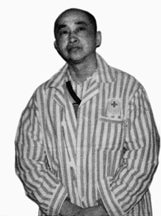
DANGEROUS MINDS
 Political
Psychiatry in China Today and
Political
Psychiatry in China Today and its Origins in the Mao Era
Printer-friendly version [pdf] (2.1 MB)
Human Rights Watch and
Geneva Initiative on
Psychiatry
Copyright © August 2002 by Human Rights
Watch.
All rights reserved.
Printed in the United States of America
ISBN: 1-56432-278-5
Library of Congress Control Number: 2002109978
Wang Wanxing, a dissident held at the Beijing
Ankang institute since June 1992 for unfurling a
pro-democracy banner in Tiananmen Square.

TABLE OF CONTENTS
- To
the Chinese Government
To the Chinese Psychiatric and Mental Healthcare Community
To the International Psychiatric Community
To Other Governments and International Bodies
Judicial Psychiatry in China and its Political Abuses
II. International Standards on Ethical Psychiatry
- Law
and Psychiatry Prior to 1949
The Early Years of the People's Republic
The Cultural Revolution
Psychiatric Abuse in the Post-Mao Era
VII. The Matrix of Theory and Practice: Readings from the Legal-Medical Literature
- The
Dangerousness Criterion
Official Statistics on Political Psychiatry
Diagnostic Concerns
An Illustrative Case
Appendices
Appendix I: The Cultural Revolution and Late 1970s
- Document
1: "Give Full Prominence to Politics and Follow China's Own Path Toward
the Cure and Prevention of Psychiatric Illness," Chinese Journal of Neurology
and Psychiatry, April 1966
Document 6: "More on the Essential Nature of Mental Illness," Jia Rubao, April 1977
- Document
8: "Summary and Analysis of Papers Submitted to the First
National Academic Conference on Forensic Psychiatry," Jia Yicheng, September
1987
Document 11: "On Negative Political Speech and Action," Liu Baiju, August 2000
- Document
14: "Mental Health Law of the People's Republic of China" (Ninth Draft),
October 1990
This report was researched and written by Robin Munro, a London-based expert on China human rights issues who served as principal China researcher and director of the Hong Kong office of Human Rights Watch during 1989-1998. Munro also selected and translated the documents appearing in the appendices. Robert van Voren, secretary general of the Geneva Initiative on Psychiatry, wrote the section titled, "The Soviet Case: Prelude to a Global Consensus on Psychiatry and Human Rights."
The chapter titled "Judicial Psychiatry in China and its Political Abuses" was first published in the Columbia Journal of Asian Law, vol. 14, no. 1, 2000 (actual publication date: January 2001) and is used with permission. While writing it, Munro was a Senior Research Fellow at the Law Department and Centre of Chinese Studies, School of Oriental and African Studies (SOAS), University of London, and a member of the School's Law and Public Health in Developing Countries Research Group. He gratefully acknowledges the kind assistance of Dr. James Birley, former president of the U.K. Royal College of Psychiatrists; Richard J. Bonnie, John S. Battle Professor of Law and Director of the University of Virginia Institute of Law, Psychiatry and Public Policy; Professor Donald C. Clarke of the University of Washington School of Law; Dr Frank Dikötter, Director of the Contemporary China Institute, SOAS; John Gunn CBE, Professor of Forensic Psychiatry, Institute of Psychiatry, King's College, London; Professor Michael Palmer, Head of the Law Department, SOAS; Leonard S. Rubenstein J.D., Executive Director of Physicians for Human Rights, Boston; and Robert Van Voren of the Geneva Initiative on Psychiatry; all of whom provided valuable comments on earlier versions of the Columbia Journal article. Munro also gratefully acknowledges the generous assistance of Sir Joseph Hotung, member of the Governing Body of SOAS, in providing financial support for the research fellowship that produced the article.
Jim Birley also provided expert commentary on the documentary appendices to this report, and Richard Bonnie and Leonard Rubenstein gave important advice on the drafting of the Recommendations.
Sidney Jones, then Executive Director of the Asia Division of Human Rights Watch, and Cythnia Brown, consultant to Human Rights Watch, edited the report. Copy editing assistance was provided by Neelangani De Soyza and Liz Weiss, Human Rights Watch associates.

